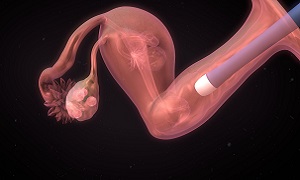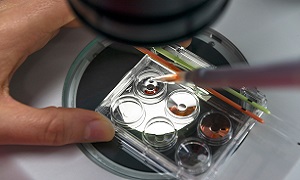ICSI
Intra Cytoplasmic Sperm Injection, known as ICSI, is a technique of injecting the sperm cell into the cytoplasm of the egg. This technique is a specialized form of In Vitro Fertilization (IVF) which is used for the treatment of severe cases of male-factor infertility. The treatment involves injecting a single sperm directly into a mature egg. This treatment is generally performed in parallel with IVF, where after suitable stimulation the retrieved eggs from a woman after mixed with the sperm of the partner.
Over the years, ICSI and IVF have enabled numerous infertile couples to get pregnant when, without it, they would most likely not have been able to conceive.
Purpose
ICSI can help to overcome several kinds of fertility problems, in various cases such as:
- The male partner produces too few sperm for artificial insemination or IVF.
- The sperm can have trouble attaching to the egg.
- The sperm might not move in a normal fashion.
- In vitro matured eggs are being used.
- Previously frozen eggs are being used.
- A blockage in the male reproductive tract can sometimes keep the sperm from getting out.
- Eggs have not been fertilized by traditional IVF, regardless of the condition of the sperm.
Procedure
Like any standard IVF treatment, you will receive fertility drugs in order to stimulate your ovaries to develop several mature eggs for fertilization. When your eggs are ready for collection they will be retrieved during a short outpatient procedure. The collected eggs can be used immediately or frozen and used later on.
The sperms are meanwhile collected from the semen sample of the male partner, after which they are washed and a single best sperm is chosen. This sperm is carefully injected into the cytoplasm of the egg with the use of very fine needles. A very powerful microscope is used while carrying out the entire procedure of fertilization.
This fertilized egg is next placed in an incubator. Signs of fertilization generally show after around 24 hours. The egg continues to divide and form an embryo.
When the embryo is three days old and having eight cells, it is ready for being transferred to the uterus. Sometimes the transfer can be done on the fifth day which is known as a blastocyst transfer.
If you’re just having one embryo transferred, then having a blastocyst transfer helps to improve your chances of a successful, healthy, single baby. If all goes well, an embryo will be attaching to your uterus wall and continue growing to become your baby. You can take a pregnancy test after around two weeks.
Risks
There is a higher risk of congenital conditions in your baby. During a natural conception, only the hardest sperm can break through the membrane of an egg for fertilizing it. Weaker sperm is unable to make it. But since this ICSI treatment bypasses this natural selection process, the risk of rare genetic problems carried by the sperm being passed on to the child increases. Some genetic problems can be tested before you have the treatment.
Success rates
Generally, ICSI can fertilize around 50 to 80 percent of the eggs, but sometimes few problems might occur during or after the procedure.
- A few, many, or all of the eggs may be damaged.
- The embryo’s growth might stop
- Even after being injected with sperm, the egg might not grow into an embryo
Once fertilization takes place, the chance of giving birth for a couple to a single baby, twins, or triplets, is the same if they have IVF with or without ICSI.
In ICSI and IVF, the chances of birth defects in the baby are a bit slightly higher than in natural conception. However, the slightly higher risk of birth defects is generally known to be due to infertility and not the treatments used to overcome infertility.
There are certain conditions that are associated with the use of ICSI, which include Beckwith-Wiedemann syndrome, Angelman syndrome, hypospadias, or sex chromosome abnormalities. They generally occur in over less than 1% of children who are conceived using this technique.
In some cases, the problems causing infertility might be genetic. For example, male children who are conceived with the use of ISCI might have the same infertility issues as their father.



